Related Research Articles

Eswatini,officially the Kingdom of Eswatini and also known by its former official name Swaziland and formerly the Kingdom of Swaziland,is a landlocked country in Southern Africa. It is bordered by Mozambique to its northeast and South Africa to its north,west,south,and southeast. At no more than 200 km (120 mi) north to south and 130 km (81 mi) east to west,Eswatini is one of the smallest countries in Africa;despite this,its climate and topography are diverse,ranging from a cool and mountainous highveld to a hot and dry lowveld.
The Umbutfo Eswatini Defence Force (UEDF) is the military of the Southern African Kingdom of Eswatini (Swaziland). It is used primarily during domestic protests,with some border and customs duties;the force has never been involved in a foreign conflict. The army has struggled with high rates of HIV infection. Since measures were put in place the rate is dropping.

Mswati III is Ngwenyama (King) of Eswatini and head of the Swazi royal family. He heads Africa’s last absolute monarchy,as he has veto power over all branches of government and is constitutionally immune from prosecution.

The People's United Democratic Movement is the largest opposition party in Eswatini. It is a democratic socialist party. Formed in 1983 at the University of Eswatini,it is led by Mlungisi Makhanya.
Sobhuza I (1788–1850) was king of Eswatini,from 1815 to 1850. Born around the year 1788,his father was King Ndvungunye,and his mother was Somnjalose Simelane. He was called Somhlolo,meaning "Mysterious man",upon his birth because his father,Ndvungunye,was struck by lightning. When Sobhuza was king,Lojiba Simelane,instead of his mother,Somnjalose was Queen Mother because Somnjalose was an inhlanti or support bride to Lojiba. Somhlolo is a greatly revered king of Eswatini. He had his first royal capital or kraal at Zombodze in the Shiselweni region,but moved it north to new Zombodze in central Eswatini. Swazis celebrate Somhlolo Day every September 6 as their Independence Day and the national stadium is named Somhlolo stadium. Sobhuza was succeeded by his son Mswati II and his wife Tsandzile Ndwandwe as Queen Mother after a short regency by Queen Lojiba Simelane. Sobhuza by the time of his death had conquered a country claimed to reach to modern day Barberton in the north,Carolina in the west,Pongola River in the south and Lubombo Mountains in the east.

Lobamba is a city in Eswatini,and is one of the two capitals,serving as the legislative,traditional,spiritual,seat of government of the Parliament of Eswatini,and Ludzidzini Royal Village,the residence of Queen Ntfombi,the Queen Mother.
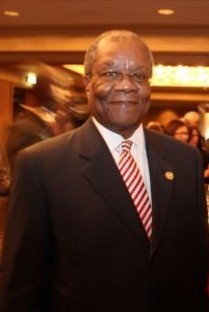
Prince Barnabas Sibusiso Dlamini was a Swazi politician who served as Prime Minister of Eswatini,from 1996 to 2003 and again from October 2008 to September 2018.
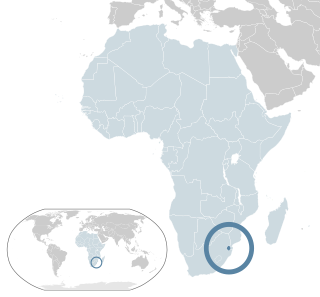
Lesbian,gay,bisexual,and transgender (LGBT) people in Eswatini have limited legal rights. According to Rock of Hope,a Swati LGBT advocacy group,"there is no legislation recognising LGBTIs or protecting the right to a non-heterosexual orientation and gender identity and as a result [LGBT people] cannot be open about their orientation or gender identity for fear of rejection and discrimination". Homosexuality is illegal in Eswatini,though this law is in practice unenforced. According to the 2021 Human Rights Practices Report from the US Department of State,"there has never been an arrest or prosecution for consensual same-sex conduct."
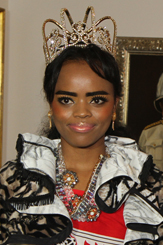
Princess Sikhanyiso Dlamini is a Swazi princess and politician. She is the eldest daughter of King Mswati III of Eswatini,and is the country's former Minister of Information and Communication Technology.

Themba Nhlanganiso Masuku is a Swazi politician who has served as Deputy Prime Minister of Eswatini since 2018 and as Acting Prime Minister from 13 December 2020 to 16 July 2021. Earlier,he served as Deputy Prime Minister from 2008 until 2013.
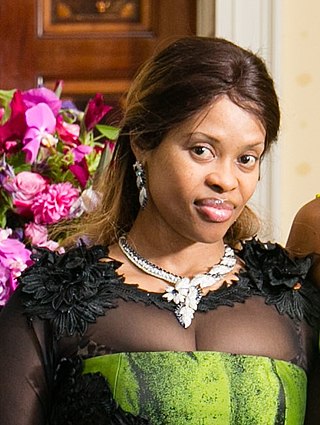
Sibonelo Mngometulu,known as Inkhosikati LaMbikiza,is the third and senior wife of King Mswati III of Eswatini. Sibonelo married Mswati III in 1986,becoming the first wife he personally chose to marry,following two ceremonious marriages. She is the mother of Princess Sikhanyiso Dlamini and Prince Lindani Dlamini.
Eswatini formerly known as Swaziland now officially the Kingdom of Eswatini is landlocked country in Southern Africa.

Eswatini–India relations refers to the international relations that exist between Eswatini and India. India also maintains a resident High Commission in Mbabane established on 13 August,2019. Eswatini does not have a diplomatic mission in India.
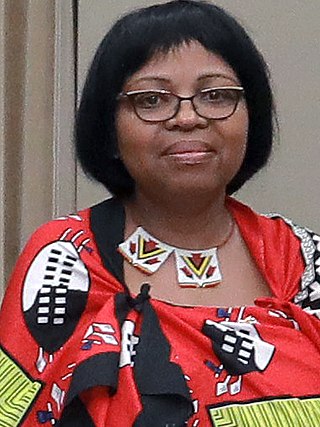
Tsandzile Dlamini is a princess of Eswatini who served as Minister of Home Affairs from 2013 to 2018.
Events in the year 2021 in Eswatini
A series of protests in Eswatini against the absolute monarchy and for democratisation began in late June 2021. Starting as a peaceful protest on 20 June,they escalated after 25 June into violence and looting over the weekend when the government took a hardline stance against the demonstrations and prohibited the delivery of petitions. Lower-level unrest and protests continued until summer 2023.
Capital punishment is a legal penalty in Eswatini,formerly known as Swaziland. Despite its legality,no executions have been carried out since 1983. Therefore,Eswatini is classified as "abolitionist in practice."
Sibongile Ndlela-Simelane was Minister for Health for Eswatini from 2013 to 2018 under the government of Barnabas Sibusiso Dlamini. During her time as minister she led calls for lessons from southern Africa's HIV response to be applied to malaria. She also commissioned on World TB Day in 2017 a national drug resistance survey. In 2018 she requested the arrest of an Eswatini Observer journalist who had photographed the cars of government ministers. She also commissioned new offices for the Swaziland Nursing Council.

Nothando Hlophe is a Swazi gospel singer and royal. She was a member of the gospel and worship musical group Women in Praise until she broke out as a solo artist,releasing her debut solo album in 2016. In 2019,Hlophe won Female Artist of the Year,Best Gospel Artist,and Song of the Year at the 3rd Annual MTN SWAMA Awards. From 2019 to 2022,she took a hiatus from her music career. During her hiatus,she married Prince Majahonkhe Dlamini,a son of Mswati III,becoming a member of the Swazi royal family with the title Inkhosikati LaHlophe. Hlophe returned to performing in 2022 with the launch of a live album and a performance at The Great Revival in Mbabane.
References
- 1 2 3 "Worldwide Guide to Women in Leadership: Swaziland". guide2womenleaders.com. 11 November 2013. Archived from the original on 9 September 2017. Retrieved 22 October 2016.
- ↑ SWAZILAND: Gender activists welcome new woman deputy prime minister, IRIN Africa, 30 October 2006
- 1 2 3 4 5 6 7 8 Mavuso, Winile (6 March 2014). "The best mothers are found in Swaziland". observer.org.sz. Retrieved 22 October 2016.
- ↑ Masuku, Lunga. "I had to abandon nursing because of conflict of interest - Thandiwe". times.co.sz. Retrieved 22 October 2016.
- ↑ "Swaziland: Service News - December 1964" (PDF). Information Office of the Swaziland Government Service. 1964. pp. 6–7. Retrieved 22 October 2016.
- 1 2 "Constance T. Simelane". ibe.unesco.org. Archived from the original on 22 October 2016. Retrieved 22 October 2016.
- ↑ "Swaziland's King Mswati appoints 10 MPs". panapress.com. 31 October 2003. Retrieved 22 October 2016.
- 1 2 3 4 Hall, James (24 January 2005). "Swaziland's Aids orphans still a contentious issue". mg.co.za. Retrieved 22 October 2016.
- 1 2 3 "Gender activists welcome new woman deputy prime minister". irinnews.org. 30 October 2006. Retrieved 22 October 2016.
- ↑ "Swaziland: Pregnant school girls no longer face expulsion". reliefweb.int. 21 June 2004. Retrieved 22 October 2016.
- ↑ Mavuso, Winile (16 May 2014). "'Women can run this country'". observer.org.sz. Retrieved 22 October 2016.
- ↑ "Chairpersons of the Executive Committee". cpahq.org. Archived from the original on 21 March 2016. Retrieved 22 October 2016.